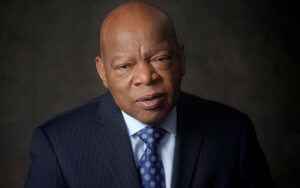The Passing of an Iconic Leader
Courage, perseverance and the need for ‘good trouble’ – the lessons of John Lewis
By Mike DeGrosky
I cannot recall when I first became fully aware of Representative John Lewis. I am not particularly a student of the Civil Rights Movement, though I have a solid 8th grade Civics kind of understanding of its importance and have long admired the leadership of the Reverend Martin Luther King. More recently, I think around the release of the movie Selma, John Lewis came into my view. Lewis is an icon of the civil rights movement, one of the so-called “Big Six” leaders of that movement: a founding member and Chairman of the Student Nonviolent Coordinating Committee, one of the original Freedom Riders, an organizer of the 250,000-person March on Washington for Jobs and Freedom, and the leader of the march from Selma to Montgomery now immortalized as “Bloody Sunday.”
Until his recent death, Lewis was serving his 17th consecutive term as the member of the U.S. House of Representatives representing Georgia’s 5th District. The degree to which Lewis’s constituents supported him is legendary. Lewis’s influence in Congress was moral, with many considering him “the conscience of the Congress.” I am aware that not all Wildfire readers may share Lewis’s politics as he was staunchly liberal, but the purpose of this column is not to celebrate his politics, but his leadership. John Lewis embodied characteristics that I both admire in leaders and see as common among effective leaders, both those I have known personally and others that I have studied.
Humble Beginnings/ Humble Leadership
Many leaders enjoyed advantages early in life that facilitated their path to leadership. John Lewis was not one of those people. Born in rural Alabama, Lewis was the third of ten children whose parents were sharecroppers and grew up in an era of racial segregation. I have noticed in my life that people of humble origins often remain modest people throughout life. Humble people can become humble leaders, those who connect with others at a human level; create a climate of trust, equality and respect; and understand their own limitations. By all accounts, John Lewis was such a person. Despite being honored many times in many ways, including both the Presidential Medal of Freedom and the only Profile in Courage Award for Lifetime Achievement, Lewis was known as a man largely unaffected by the praise he received.
Dedication and Commitment to Purpose
John Lewis dedicated his life to a driving purpose –racial equality and justice. I recently read in The Guardian that, in an interview just before his death, Lewis told Oprah Winfrey “I tried to do what was right, fair and just. When I was growing up in rural Alabama, my mother always said ‘Boy, don’t get in trouble… but I saw those signs that said ‘white,’ ‘colored’ and I would say ‘Why?’ And she would say again, ‘Don’t get in trouble. You will be beaten. You will go to jail. You may not live.’ But the words of Dr. King and the actions of Rosa Parks inspired me to get in trouble and I’ve been getting in trouble ever since. Good trouble. Necessary trouble.” Damn, but I love Lewis’s idea of “good trouble!” Leadership requires risk. Leadership requires courage. Sometimes leadership requires a willingness to get in good trouble.
Courage and Perseverance
Anyone reading this column for any time knows that I regard courage as a leadership essential. I’ve cited before an article by Bill George, a Senior Fellow at the Harvard Business School, who wrote about how courageous leaders boldly take risks and go against the grain, and that their boldness both inspires people and puts them and their organization in the position of leading societal change. In that article, George discussed how leaders needed courageto stick to their principles and not give in to the fear of facing criticism or even failing. Lewis took courageous leadership to an extraordinary level, having been arrested dozens of times, jailed, and brutally beaten more than once during the civil rights movement.
On “Bloody Sunday” Lewis and a colleague led a 600-person march from Selma to Montgomery where, after crossing the Edmund Pettus Bridge, they were attacked by Alabama State Troopers, one of whom fractured Lewis’s skull. It is important to note that Lewis was a lifelong adherent to the principles of non-violence and that he was simply leading a peaceful protest march. The march and the events of that day, televised around the world, led directly to the passage of the Voting Rights Act. Lewis’s courage included risking his physical safety, even his life to fight for what he believed. Said Lewis in a USA Today interview commemorating the 50th anniversary of the march, “It just reminds me that some of us gave a little blood on that bridge to redeem the soul of America, to make America better.” Reflecting his belief in perseverance, Lewis once told supporters “Our struggle is not the struggle of a day, a week, or a year, it is the struggle of a lifetime. Never be afraid to make some noise and get in good trouble, necessary trouble.” Leadership words to live by.
Inspirational
On John Lewis’s death, Barack Obama observed that “…through the decades, he not only gave all of himself to the cause of freedom and justice, but inspired generations that followed to try to live up to his example.” Academy award nominated film director Ava DuVernay, in a tribute to Lewis, recently wrote that she would “never forget what you taught me and what you challenged me to be. Better. Stronger. Bolder. Braver.”
John Lewis’s life reminds me of an anonymous quote, oft mis-attributed to John Quincy Adams, that I include in a set of encouragements that I leave for myself as a source of motivation and strength. “If your actions inspire others to dream more, learn more, do more and become more, you are a leader.”

Author: Mike DeGrosky is Chief of the Fire Protection Bureau for the Montana Department of Natural Resources and Conservation, Forestry Division. He taught for the Department of Leadership Studies at Fort Hays State University for 10 years. Follow Mike on Twitter @guidegroup or via LinkedIn.

